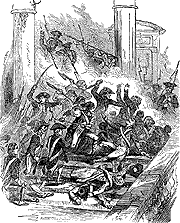European Politics
 |
| The massacre of the royal guard occurred Aug. 10, 1792, and was one of the major events of the French revolution as the French people rose up against the ruling monarchy. Image © 2002 www.clipart.com. |
Although many European powers had claims to land in or surrounding the
United States, political matters in their own countries challenged whether or not they had the strength to hold on to that U.S. territory.
France and Great Britain established a hostile relationship that resulted in the French Revolutionary Wars (1792-1802) and the Napoleonic Wars (1803-15), which immediately followed the French Revolution (1789-1793). The French Revolution involved the poor financial state of France and its effects on different social classes. The nobility and clergy who governed France imposed heavy taxes on the working class peasants—small landowners, tenant farmers, laborers, shopkeepers, etc.—in order to pay for foreign wars, court luxuries, and the growing national debt. In response to this unfair treatment, the masses revolted, resulting in a four-year struggle for justice.
The French Revolutionary Wars, which immediately followed the French Revolution, initially intended to defend the Revolution but grew into wars of conquest under the empire. In 1792, for example, the Legislative Assembly of France originally desired to spread revolutionary ideals abroad as well as protect its own national and international position. That led them to declare war against Austria. As several European countries began to object to the spirit of the revolution and the vicious masses who swept France, initial intentions were dismissed and more war resulted. During those 10 years, France was engaged in war with many countries, including Britain, Spain, and Russia, all of which held claims to American territory at the time.
The peaceful period of 1801-02 served as a transition into the Napoleonic wars that began in May of 1803 when Great Britain again waged war on France. Britain saw this action as necessary since the peace treaty existing between them had broken down and proven ineffective.
This constant threat of conflict throughout Europe created an antagonistic atmosphere that forced most countries to primarily defend their homelands. Thus, with such turmoil on their own soil, Britain, Spain, Russia, and especially France were unable to fully focus their attention on the lands to which they lay claim in the newly developing United States.
France's selling of the Louisiana Territory is a prime example of Europe's chaotic state. While Napoleon succeeded in recapturing Louisiana from Spain, he generously offered it to the United States for a number of reasons. Because Britain was about to wage war on France (the beginning of the Napoleonic Wars), Napoleon feared that Britain would block his access to Louisiana. This would create a distraction, for France would feel obligated to redirect a surplus of French resources toward protecting the colony. Ultimately, Napoleon had to decide what was most important, and he chose to focus on protecting his own country. By selling the Louisiana Territory to the United States, France would acquire the money ($15 million) necessary to prepare the French military for ensuing battles on its own soil.
< back | next >
|



